[slingshot_ad name=”Slingshot Banner Ad”]
Need to know: Wednesday, June 8, 2016
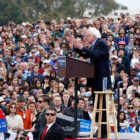
Will Bernie Sanders’ defeat also end America’s latest Great Awakening?
The most secular candidate in modern times has inspired what looks like a classic religious revival.

A year after the Charleston church shooting, what has changed?
And for some Charlestonians, it has been a test of faith.

Southern Baptists decline as Assemblies of God grow
The Assemblies of God are benefiting from immigration much more than the Southern Baptist Convention.
Police investigating shooting at Baltimore church
As family and friends gathered to remember a 22-year-old gunned down last month, his brother pulled out a gun and shot their father. The two men had argued over an obituary which omitted the brother’s name.

California’s End of Life Option law: More peaceful deaths or moral quicksand?
California's law expands access to aid in dying to 1 in 6 terminally ill Americans. Opponents see danger ahead for the elderly and vulnerable.
[slingshot_ad name=”Slingshot Middle Cube Ad”]
Latest news from RNS
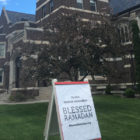
Minnesota churches wish Muslim neighbors a ‘blessed Ramadan’
(RNS) Islamophobia is “not who we are in Minnesota.” So a group of churches there is reaching out to its Muslim neighbors, wishing them a blessed Ramadan.

Gladiator screenwriter to pen biopic of Sufi mystic Rumi
(RNS) David Franzoni, whose script helped clinch the best-picture Academy Award for 'Gladiator' in 2001, is embarking on a new project charting the life of the beloved poet, scholar and Sufi mystic Jalaluddin al-Rumi.

Pope puts Guam archbishop accused of sex abuse on leave
The latest sign that Francis is taking tougher steps to tackle the sexual abuse crisis.
More views from RNS
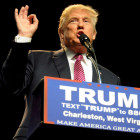
Donald Trump’s genius
Donald Trump’s outrageous response to the judge assigned to the Trump University case has successfully distracted all of us from the real issue at hand: the newly released documents on his allegedly fraudulent business. They are indeed chilling.

The Gospel Coalition and how (not) to engage culture
Jonathan Merritt chides the influential group for a bunker mentality that silences any who dare to question its thinking.
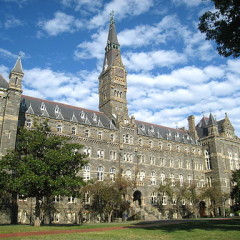
A creative approach to Georgetown’s sin of slavery
[caption id="attachment_184715" align="aligncenter" width="512"]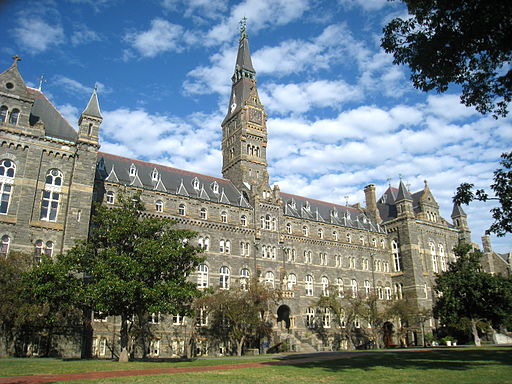 Georgetown University's Healy Hall in Washington, D.C[/caption]
In a comment to one of the many blog posts about a controversy concerning Georgetown University’s past with slavery, we read: “I did not enslave anyone. I did not profit from slavery.” Such an abrupt dismissal of the moral issues is alienating, but the responder who added this comment hung around long enough to quicken some creative thoughts.
He rightfully reminded others that “it has been 150 years” since the founders of Georgetown sold 272 people into slavery, a horror story if we ever heard one, and we hear many. But “time has moved on.” What is more, “there is no one to ask forgiveness from, as the last slave died in the twentieth century.” The same responder went on to propose some practical reparatory and constructive attitudes and actions in our twenty-first century.
One of the fortunate by-products of a controversy, which could have degenerated into stale rehashing of charges about “Political Correctness” or blame games in which “the other” is always the errant party, results in part because of the locale and heritage of the current controversy. For example: too often public debates about what used to be called “sin” or “guilt” or “evil” has been softened into the pap of “I made a mistake.”
The Georgetown Jesuits of 1838 did not make a mistake. In terms that their religious order understands and fosters, they “sinned” in this gross misuse of humans. Margot Patterson in Jesuit-related America magazine noted how “Georgetown has been claiming its sinful history” and is grappling with means to deal with it. Patteron’s headline reflects this tradition: “Acts of Penance.”
Discussion of religion in public life too often thins out and fails to show how classic religious terms and issues can throw light on current issues, far beyond “my mistake” or “gotcha.” This one can be different. Cheered as we might be by the way Georgetown is very frankly and openly facing up to its ancestors’ sins and the need of its descendants in our time to look ahead, more is needed than “moving on.”
The public can debate and most will applaud Georgetown’s efforts to track down and reward descendants of the enslaved 272 or to address various other evils identifiable as directly related to slavery. But most cheering are the many comments, which regard the Georgetown incident as providing a “teaching moment” of great promise.
Immediately one can recognize that not only Georgetown and not only slavery need to be examined and dealt with. While, yes, “I didn’t enslave anyone” and “I didn’t profit by slavery” in a picky isolated sense, most of us citizens have to recognize that we “did” profit from slavery and its economic connections.
How to handle all this creatively? For beginnings, one asks the right questions. Philosopher Max Scheler in his provocative writings on “change of heart” is helpful. We’ll paraphrase, while trying to be faithful to his questions, even if only his “alas” words are literal.
Scheler reminds us that we cannot change the past. The past does not exist. What exists are attitudes toward past actions. So, yes, one first asks, “Alas! What did our ancestors do?” be they enslavers or other offenders. One studies history and gains perspective from such a question, but answering it changes little. So one next asks, “Alas! What did I [or my people, tribe, class, nation, church or order] do?” Answering that throws light on the past, but, still, the past is past.
So we move on to the fruits of “penance” and “listening” and “care for the other” by taking up Scheler’s next creative question: “What kind of person am I now that I am capable of doing [this or that] evil thing?”
The Georgetown incident and aftermath do not lead to the resolution of the heritage of slavery issues. But most religious and many spiritual traditions prompt self-examination and, following sacred texts and communities or “the better angels of our nature,” they can help effect more “reparations” than the responsible Georgetown folk themselves can offer.
Otherwise we are left with only an “Alas!”
Georgetown University's Healy Hall in Washington, D.C[/caption]
In a comment to one of the many blog posts about a controversy concerning Georgetown University’s past with slavery, we read: “I did not enslave anyone. I did not profit from slavery.” Such an abrupt dismissal of the moral issues is alienating, but the responder who added this comment hung around long enough to quicken some creative thoughts.
He rightfully reminded others that “it has been 150 years” since the founders of Georgetown sold 272 people into slavery, a horror story if we ever heard one, and we hear many. But “time has moved on.” What is more, “there is no one to ask forgiveness from, as the last slave died in the twentieth century.” The same responder went on to propose some practical reparatory and constructive attitudes and actions in our twenty-first century.
One of the fortunate by-products of a controversy, which could have degenerated into stale rehashing of charges about “Political Correctness” or blame games in which “the other” is always the errant party, results in part because of the locale and heritage of the current controversy. For example: too often public debates about what used to be called “sin” or “guilt” or “evil” has been softened into the pap of “I made a mistake.”
The Georgetown Jesuits of 1838 did not make a mistake. In terms that their religious order understands and fosters, they “sinned” in this gross misuse of humans. Margot Patterson in Jesuit-related America magazine noted how “Georgetown has been claiming its sinful history” and is grappling with means to deal with it. Patteron’s headline reflects this tradition: “Acts of Penance.”
Discussion of religion in public life too often thins out and fails to show how classic religious terms and issues can throw light on current issues, far beyond “my mistake” or “gotcha.” This one can be different. Cheered as we might be by the way Georgetown is very frankly and openly facing up to its ancestors’ sins and the need of its descendants in our time to look ahead, more is needed than “moving on.”
The public can debate and most will applaud Georgetown’s efforts to track down and reward descendants of the enslaved 272 or to address various other evils identifiable as directly related to slavery. But most cheering are the many comments, which regard the Georgetown incident as providing a “teaching moment” of great promise.
Immediately one can recognize that not only Georgetown and not only slavery need to be examined and dealt with. While, yes, “I didn’t enslave anyone” and “I didn’t profit by slavery” in a picky isolated sense, most of us citizens have to recognize that we “did” profit from slavery and its economic connections.
How to handle all this creatively? For beginnings, one asks the right questions. Philosopher Max Scheler in his provocative writings on “change of heart” is helpful. We’ll paraphrase, while trying to be faithful to his questions, even if only his “alas” words are literal.
Scheler reminds us that we cannot change the past. The past does not exist. What exists are attitudes toward past actions. So, yes, one first asks, “Alas! What did our ancestors do?” be they enslavers or other offenders. One studies history and gains perspective from such a question, but answering it changes little. So one next asks, “Alas! What did I [or my people, tribe, class, nation, church or order] do?” Answering that throws light on the past, but, still, the past is past.
So we move on to the fruits of “penance” and “listening” and “care for the other” by taking up Scheler’s next creative question: “What kind of person am I now that I am capable of doing [this or that] evil thing?”
The Georgetown incident and aftermath do not lead to the resolution of the heritage of slavery issues. But most religious and many spiritual traditions prompt self-examination and, following sacred texts and communities or “the better angels of our nature,” they can help effect more “reparations” than the responsible Georgetown folk themselves can offer.
Otherwise we are left with only an “Alas!”
 Author, Martin E. Marty, is the Fairfax M. Cone Distinguished Service Professor Emeritus of the History of Modern Christianity at the University of Chicago Divinity School. His biography, publications, and contact information can be found at www.memarty.com.
Author, Martin E. Marty, is the Fairfax M. Cone Distinguished Service Professor Emeritus of the History of Modern Christianity at the University of Chicago Divinity School. His biography, publications, and contact information can be found at www.memarty.com.
This post appears courtesy of Sightings, a publication of the University of Chicago Divinity School's Martin Marty Center. To read previous issues of Sightings, click here.
 Georgetown University's Healy Hall in Washington, D.C[/caption]
In a comment to one of the many blog posts about a controversy concerning Georgetown University’s past with slavery, we read: “I did not enslave anyone. I did not profit from slavery.” Such an abrupt dismissal of the moral issues is alienating, but the responder who added this comment hung around long enough to quicken some creative thoughts.
He rightfully reminded others that “it has been 150 years” since the founders of Georgetown sold 272 people into slavery, a horror story if we ever heard one, and we hear many. But “time has moved on.” What is more, “there is no one to ask forgiveness from, as the last slave died in the twentieth century.” The same responder went on to propose some practical reparatory and constructive attitudes and actions in our twenty-first century.
One of the fortunate by-products of a controversy, which could have degenerated into stale rehashing of charges about “Political Correctness” or blame games in which “the other” is always the errant party, results in part because of the locale and heritage of the current controversy. For example: too often public debates about what used to be called “sin” or “guilt” or “evil” has been softened into the pap of “I made a mistake.”
The Georgetown Jesuits of 1838 did not make a mistake. In terms that their religious order understands and fosters, they “sinned” in this gross misuse of humans. Margot Patterson in Jesuit-related America magazine noted how “Georgetown has been claiming its sinful history” and is grappling with means to deal with it. Patteron’s headline reflects this tradition: “Acts of Penance.”
Discussion of religion in public life too often thins out and fails to show how classic religious terms and issues can throw light on current issues, far beyond “my mistake” or “gotcha.” This one can be different. Cheered as we might be by the way Georgetown is very frankly and openly facing up to its ancestors’ sins and the need of its descendants in our time to look ahead, more is needed than “moving on.”
The public can debate and most will applaud Georgetown’s efforts to track down and reward descendants of the enslaved 272 or to address various other evils identifiable as directly related to slavery. But most cheering are the many comments, which regard the Georgetown incident as providing a “teaching moment” of great promise.
Immediately one can recognize that not only Georgetown and not only slavery need to be examined and dealt with. While, yes, “I didn’t enslave anyone” and “I didn’t profit by slavery” in a picky isolated sense, most of us citizens have to recognize that we “did” profit from slavery and its economic connections.
How to handle all this creatively? For beginnings, one asks the right questions. Philosopher Max Scheler in his provocative writings on “change of heart” is helpful. We’ll paraphrase, while trying to be faithful to his questions, even if only his “alas” words are literal.
Scheler reminds us that we cannot change the past. The past does not exist. What exists are attitudes toward past actions. So, yes, one first asks, “Alas! What did our ancestors do?” be they enslavers or other offenders. One studies history and gains perspective from such a question, but answering it changes little. So one next asks, “Alas! What did I [or my people, tribe, class, nation, church or order] do?” Answering that throws light on the past, but, still, the past is past.
So we move on to the fruits of “penance” and “listening” and “care for the other” by taking up Scheler’s next creative question: “What kind of person am I now that I am capable of doing [this or that] evil thing?”
The Georgetown incident and aftermath do not lead to the resolution of the heritage of slavery issues. But most religious and many spiritual traditions prompt self-examination and, following sacred texts and communities or “the better angels of our nature,” they can help effect more “reparations” than the responsible Georgetown folk themselves can offer.
Otherwise we are left with only an “Alas!”
Georgetown University's Healy Hall in Washington, D.C[/caption]
In a comment to one of the many blog posts about a controversy concerning Georgetown University’s past with slavery, we read: “I did not enslave anyone. I did not profit from slavery.” Such an abrupt dismissal of the moral issues is alienating, but the responder who added this comment hung around long enough to quicken some creative thoughts.
He rightfully reminded others that “it has been 150 years” since the founders of Georgetown sold 272 people into slavery, a horror story if we ever heard one, and we hear many. But “time has moved on.” What is more, “there is no one to ask forgiveness from, as the last slave died in the twentieth century.” The same responder went on to propose some practical reparatory and constructive attitudes and actions in our twenty-first century.
One of the fortunate by-products of a controversy, which could have degenerated into stale rehashing of charges about “Political Correctness” or blame games in which “the other” is always the errant party, results in part because of the locale and heritage of the current controversy. For example: too often public debates about what used to be called “sin” or “guilt” or “evil” has been softened into the pap of “I made a mistake.”
The Georgetown Jesuits of 1838 did not make a mistake. In terms that their religious order understands and fosters, they “sinned” in this gross misuse of humans. Margot Patterson in Jesuit-related America magazine noted how “Georgetown has been claiming its sinful history” and is grappling with means to deal with it. Patteron’s headline reflects this tradition: “Acts of Penance.”
Discussion of religion in public life too often thins out and fails to show how classic religious terms and issues can throw light on current issues, far beyond “my mistake” or “gotcha.” This one can be different. Cheered as we might be by the way Georgetown is very frankly and openly facing up to its ancestors’ sins and the need of its descendants in our time to look ahead, more is needed than “moving on.”
The public can debate and most will applaud Georgetown’s efforts to track down and reward descendants of the enslaved 272 or to address various other evils identifiable as directly related to slavery. But most cheering are the many comments, which regard the Georgetown incident as providing a “teaching moment” of great promise.
Immediately one can recognize that not only Georgetown and not only slavery need to be examined and dealt with. While, yes, “I didn’t enslave anyone” and “I didn’t profit by slavery” in a picky isolated sense, most of us citizens have to recognize that we “did” profit from slavery and its economic connections.
How to handle all this creatively? For beginnings, one asks the right questions. Philosopher Max Scheler in his provocative writings on “change of heart” is helpful. We’ll paraphrase, while trying to be faithful to his questions, even if only his “alas” words are literal.
Scheler reminds us that we cannot change the past. The past does not exist. What exists are attitudes toward past actions. So, yes, one first asks, “Alas! What did our ancestors do?” be they enslavers or other offenders. One studies history and gains perspective from such a question, but answering it changes little. So one next asks, “Alas! What did I [or my people, tribe, class, nation, church or order] do?” Answering that throws light on the past, but, still, the past is past.
So we move on to the fruits of “penance” and “listening” and “care for the other” by taking up Scheler’s next creative question: “What kind of person am I now that I am capable of doing [this or that] evil thing?”
The Georgetown incident and aftermath do not lead to the resolution of the heritage of slavery issues. But most religious and many spiritual traditions prompt self-examination and, following sacred texts and communities or “the better angels of our nature,” they can help effect more “reparations” than the responsible Georgetown folk themselves can offer.
Otherwise we are left with only an “Alas!”
 Author, Martin E. Marty, is the Fairfax M. Cone Distinguished Service Professor Emeritus of the History of Modern Christianity at the University of Chicago Divinity School. His biography, publications, and contact information can be found at www.memarty.com.
Author, Martin E. Marty, is the Fairfax M. Cone Distinguished Service Professor Emeritus of the History of Modern Christianity at the University of Chicago Divinity School. His biography, publications, and contact information can be found at www.memarty.com.
This post appears courtesy of Sightings, a publication of the University of Chicago Divinity School's Martin Marty Center. To read previous issues of Sightings, click here.
[slingshot_ad name=”Slingshot Bottom Cube Ad”]
Bonus tracks
- Refugees seeking asylum on religious persecution grounds quizzed on ‘Bible trivia’
- Down to one resident in 15,600 square feet, a missionary sisterhood’s home is for sale
- Trump speaks the language of the faithful
- Evangelicals like me can’t vote for Trump — or Clinton. Here’s what we can do instead.
- This is my light saber’ – Tulsa’s new bishop makes his own staff




